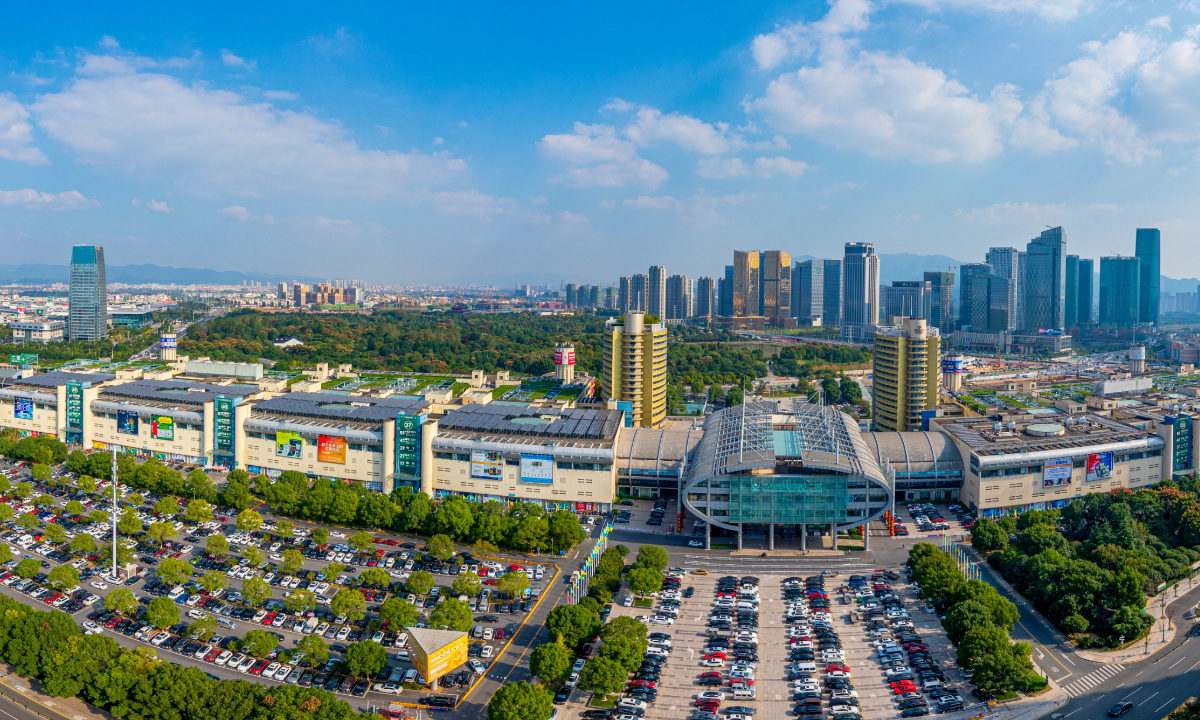
An aerial view of the Yiwu International Trade Market in Yiwu, East China's Zhejiang Province Photo: VCG
Foreign businesses on Wednesday reacted positively to China's new cross-border travel policy, expressing eagerness to return to China for work resumption and high expectation for a full-fledged recovery in the world's second-largest economy.
Coronavirus tests on arrival will stop from January 8, and people arriving in China from abroad for work, business, study and family reunion will no longer need to undergo mandatory quarantine, the State Council's Joint Prevention and Control Mechanism said on Tuesday.
Wang Wenbin, spokesperson of China's Foreign Ministry, said on Wednesday that the new measure will create better conditions for safe and healthy cross-border personnel exchange in an orderly fashion, ensure foreign exchanges and cooperation, and benefit growth of the global economy.
"China will strive for economic and social development… unswervingly expand opening-up and join hands with all parties for international anti-COVID cooperation, and help aid global industrial and supply chain security and boost global economic recovery," Wang said.
"After the Chinese authorities announced the policy change, we immediately informed our executives in Switzerland of the new measures and arranged our CEO Frank Hammes's trip to China after the Chinese Lunar New Year," Han Jingjing, a sales and marketing vice president at Swiss air quality technology company IQAir China, told the Global Times on Wednesday.
China has the world's most promising market and is one of the top three markets for the company, Han said, expressing optimism for business growth in China in 2023. "We hope normal cross-border business exchanges could resume as soon as possible and that China could stage a full-fledged economic recovery next year," Han said.
DHL Express China told the Global Times that the company has informed its global headquarters of the policy change and would consider inviting global executives to China.
According to a survey conducted by the China Council for the Promotion of International Trade (CCPIT), the majority of foreign firms in China are supportive of the country's optimized COVID-19 response and the country's economic outlook in 2023.
Among the 160-plus foreign firms, commerce chambers and associations surveyed, 91 percent back China's optimized COVID-19 response. Over 99 percent of the surveyed foreign firms are confident about China's economic outlook in 2023, and 98.7 percent said they would maintain and expand investment in China, the CCPIT survey showed.
The Canadian business community is reacting positively to the new travel policy, Noah Fraser, managing director and chief representative of the Canada China Business Council in China, told the Global Times on Wednesday.
He said that many executives are interested in getting back to China, "but will only do so if they can be certain they will not face any difficult conditions upon entry."
"We are eager to see the return of our international flight slots and new visas to meet increased demand. Once the borders are fully reopened, however, we anticipate a significant surge in people-to-people and business exchanges in the second half of 2023," Fraser said.
"The German Chamber of Commerce in China welcomes the lifting of quarantine requirements and the easing of COVID-19 control measures," the chamber said in a statement on its WeChat account. With series of measures kicking in, "the much-needed confidence in China's business environment will surely return next year," said the chamber.
"When we polled our companies earlier this month, over 70 percent of respondents said they expected the impact of the current epidemic to last no more than three months, meaning that they were confident that China will recover from the current outbreak in early 2023," Colm Rafferty, Chairman of the American Chamber of Commerce in China, told the Global Times.
"AmCham China has long been an advocate for a stable and balanced US-China trade relationship, and we seek to be a bridge for constructive commercial engagement between both countries.
"Throughout the pandemic, US-China trade has grown, and remains a bright spot in the bilateral relationship. We firmly believe that the ability for people from both countries to meet face-to-face once again will help facilitate a more positive trajectory in the bilateral relationship," Rafferty said.
Bai Ming, deputy director of the international market research institute at the Chinese Academy of International Trade and Economic Cooperation, told the Global Times that foreign businesses' positive response to China's adjusted anti-COVID measures underlines that China remains a popular investment destination for foreign investment, backed by its vast market, continuous opening-up and complete industrial chains.
According to data from China's Ministry of Commerce, the country's actualized foreign direct investment totaled $178.08 billion in the first 11 months this year, an increase of 12.2 percent year-on-year.
The annual Central Economic Work Conference held earlier December urged for greater efforts to attract and utilize foreign capital, widen market access, promote the opening-up of modern services sector, and grant foreign-funded enterprises national treatment.




